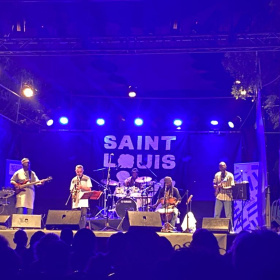Olamide — The Glory
 The Glory by Olamide album art
The Glory by Olamide album art
The Glory, Olamide's sixth studio album in six years, was released on the same day he shut down Eko Hotel for the third year running with the Olamide Live in Concert gig. An attendance of over 7,000 fans prompted many to suggest a stadium for his next concert.
The rapper's new album is the most stylish rap album of 2016. Unlike Eyan Mayweather, it has guest spots, but as with all of his albums, there are no foreign acts, an asseveration of his commitment to follow Fela's footsteps. "Baba Fela never begged anyone for Collabo," he once said in an interview, recalling an episode in which the afrobeat man accused Paul McCartney of coming to the continent to exploit African music.
While other Nigerian artists fly out of the country to collaborate with foreign artists and shoot videos in South Africa, Olamide has developed an insularity that has profited him. He has not collaborated with foreign artists, just as he has shot all his videos in Nigeria.
The new album, along with Rapsodi (his debut), has something in common with his sophomore. All are compact arrangements. The Glory arrives on the wings of an intro which opens with talking drums that last the entirety of the song and ends with a diabolic laughter typical of juju priests in Yoruba movies. This is a mild shift from his days of sampling Enya and other western occultic tunes.
The intro is followed by 'Letter to Milli', a sequel to 'Toriomo' from his Eyan Mayweather album. He tells his son, Maximilliano, to learn from his father's experiences and use them as platform to succed further. The rapper says to his son that he can be president; and for him not to want to end up like everybody else, he must do what everybody isn't doing. This is followed by 'Journey of a thousand Miles' where he exhibits some Adekunle Gold influence in his use of folkloric tunes while at the same time employing producer ID Cabasa-like melodies reminiscent of Rapsodi's.
'Pepper dem Gang' features Davolee, Lil Kesh's replacement in the YBNL camp. Unfortunately Davolee is incapable of giving Olamide a run for his money the way Lil Kesh did in 'Oga Nla' and 'Bang' on the Street OT album. Neither does he render the kind of performance Kesh rendered on 'Ladi', subduing Olamide and Phyno both lewdly and lyrically. The outstanding line on the song, "Omo to dope die bi ti Whitney" is Olamide's.
On 'Lori tit Yi', Olamide captures the sad reality of Nigeria's future, albeit unknowingly. At the begining, a kid is asked what he would like to be in future. "*Mo fe ma se yahoo yahoo," he replies just the same way his counterparts in Warri respond with, "Ayiri go school?" when advised to focus on their studies rather than dabble in oil bunkeering. Although the song tries to mask it off as a random comment from a ghetto child since it is street-themed song, it is nevertheless an exposure of a failing society and its realisation piques at one's conscience.
If the first half of The Glory album is where the regular rap songs are, the latter half is where Olamide indulges his listeners and long time fans who know his album is incomplete without a DaGrin reference. The reference is provided on the chorus of the Burna Boy-featured 'Omo Wobe Anthem' in which Burna recaptures his past by providing a hook unrivalled by any in his ouevre. His verse is a delicious blend of more than one style that shifts every few seconds without losing grip. Also in the latter half of the album is the superbly rhymed 'Owo Blow' that provides a sort of sharpness and direction for the entire album. 'Who you Epp', the most sampled song of 2016, sits at the heart of this half. It does the opposite of what 'Owo Blow' does—it makes the album jaunty in a joyful way and reminds listeners of the Wande Coal from Mushin2Mohits. 'Sons of Anarchy' another Burna-featured song has the guest sing a chorus so mellifluous its lyrics don't matter. Humming along is enough. It is, however, quite an unfortunate song for Phyno as his brief verse is swallowed whole by Burna's melody.
With six critically and commercially successful albums within six years, it may be safe to say that the Bariga-born rapper is on the verge of retirement judging from statemements like "Press P, and know when to pause" as said on 'Symbol of Hope'.
Although his countless detractors will try to lessen his enormous achievements, Olamide says on 'Oluwa Loni Glory', "Cos we came from the gutter, no matter what we do, they'll never respect us. This industry hates us.". And for those who will go further to say he isn't a core rapper, seeing as he has made too many successful pop songs, to them he says on the same song: "Business man ni mi o. Eyin le gbe rap sorry binpe KRS ni yin o." He addresses the topic again on 'Symbol of Hope': "Kini showbiz if you not making no profit?" If there's a lesson to be learnt from the Olamide story, it is on the third verse of 'Symbol of Hope': "Do what you like, don't let them put you in a box."
Should this be Olamide's last album, the loss, it must be stated, is ours not his.




















Commentaires
s'identifier or register to post comments